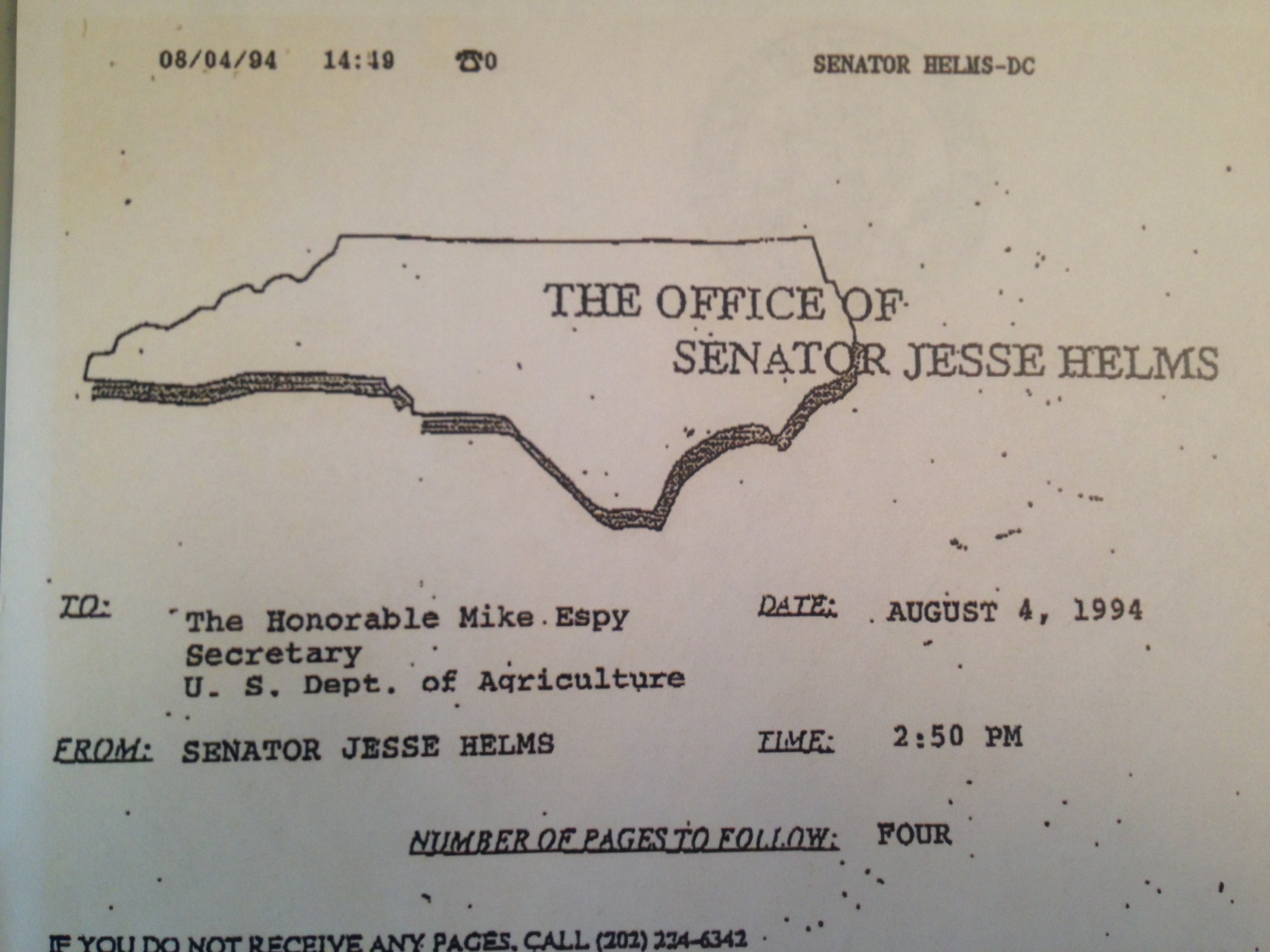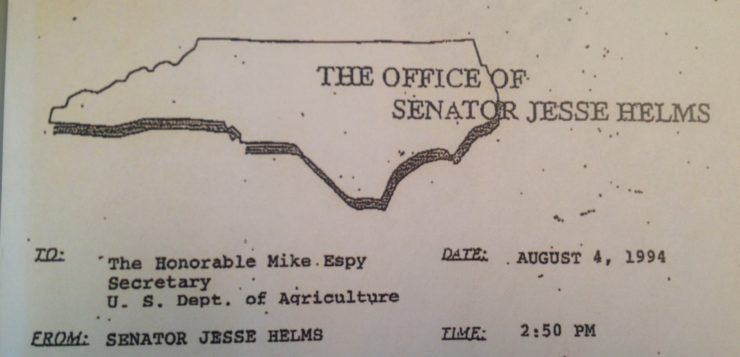
Agriculture concerning its “gay agenda.”
U.S. Senator Jesse Helms, (R-NC), maintained a political hold on employment protections for LGBT federal employees for over 25 years. The “Helms hold” was broken on June 15, 2020, when the U.S. Supreme Court issued a 6-3 ruling that Title VII of the Civil Rights Act of 1964 barred employment discrimination against LGBT workers. It seems the question is now settled. However, legal challenges are expected to arise.
My employment experience with Helms, which began in July 1994, provides insights into federal discrimination against LGBT employees and their supporters, and political tactics used to bully their traditional Democratic supporters into voting with him on an offensive anti-gay amendment.
Helms served in the U.S. Senate for 30 years and gained leadership on the Agriculture and Foreign Relations Committees. My diplomatic career involved both. At the U.S. Embassy in Mexico City, I reported on implementation of agricultural provisions of the North American Free Trade Agreement. Helms opposed nafta’s ratification.
During my work to make the Americans with Disabilities Act law, I learned about discrimination against partners and family members of people living with HIV. After ADA became law, I began working with LGBT friends to address federal workplace discrimination based on sexual orientation and HIV status. I worked closely with Dr. Leonard “Len” Hirsch, Ph. D., and other founders of Globe, for GLB Employees. I found Globe members to be highly dedicated government professionals. Globe’s members were once listed by name in a print ad for National Coming Out Day. It was an educational moment for me. I informed Globe president Dr. Hirsch that I was heterosexual, and we laughed at my “Coming Out” with my GLB friends. Len and I remained friends until his death in 2015.
After Bill Clinton’s election in 1992, his Agriculture Secretary Mike Espy, an African-American former Congressman, issued an 800-word Equal Employment Opportunity Policy Statement which included his directive to “ensure equal opportunity, respect civil rights, and create a work environment free of discrimination and harassment based on gender or sexual orientation.” It was the first time USDA included sexual orientation in its EEO program.
In early 1994, to support Secretary Espy’s EEO policy, I was appointed to USDA’s first GLB Program Manager. Again, like with Globe, transgender employees were initially excluded. Being GLB was not a requirement for the position. Many of my GLB colleagues sought employment protections by hiding their identity.
When I gave Dr. Hirsh a copy of my position description, he expressed concern about its language. The position description’s first of four elements especially alarmed him. The first element stated that one my responsibilities was: “Promoting the GLB Employment Program…” Dr. Hirsh questioned the wisdom of the word “promoting.” We agreed the job description was clumsily written. Dr. Hirsch also expressed concern with Element Four of the position description. It read: “Assisting in the recruitment of GLBs…” I agreed with his concern on “recruitment.” It reminded me of Harvey Milk’s famous line: “I am Harvey Milk and I am here to recruit you.” After my conversation with Dr. Hirsch, I rewrote the GLB position description, and substituted “manage” for “promote.”
When I took my revised position description to Espy’s officials, I was told the language had already been approved. It would not be changed, Espy’s staff told me. USDA was committed to “promoting” and “recruiting” homosexuals. The job’s position description was written, I later learned, by older heterosexual female staffers who had no knowledge of LGBT history, or the potential problems they could be creating.
I sent letters about my GLB post to Congressman Barney Frank and author Brian McNaught. I wrote Frank because he had spoken at Globe meetings and he represented an area in Massachusetts where I had relatives. In response, a staffer from Frank’s office called to offer thanks on behalf of the Congressman. I wrote McNaught because I read his Gay Issues in the Workplace and contributed copies to several government personnel offices.
To “promote” USDA’s GLB employment program, I contacted GLB student groups at agricultural colleges and universities, and some San Francisco colleges. In my letters and calls to college groups, I shared USDA’s 800-word EEO Policy statement barring GLB discrimination, and the GLB employment program, and ended by inviting students and graduates to learn about USDA’s employment opportunities.
It was a part of my job as GLB Program Manager to represent the agency at government EEO events. After I spoke on my work at an EEO conference in Arlington, VA, reporters for federal and EEO publications quoted me. The articles quickly found their way to Helms, who had major agricultural, foreign affairs, and political disagreements with President Clinton and his cabinet, especially Espy, who had served on the House Agriculture Committee. Helms wanted Espy to do more to promote tobacco, an important North Carolina crop. In June 1994, Helms had another issue with Espy: USDA’s GLB employment program. Based on their correspondence, Helms had already obtained Espy’s authorized GLB Program Manager position description. When Espy denied the post existed, Helms said Espy was incapable of managing USDA.
After reviewing the Helms/Espy letters for this article, I wondered how many times high-level government officials had such conversations, and how many times a qualified GLB employee was denied a job due solely to sexual orientation. The Helms-Espy letters are a case-study on why federal legislation was needed to prevent LGBT workplace discrimination. Massachusetts’ Rep. Gerry Studds introduced the ENDA in June 1994. It would have added sexual orientation to other Federal employment discrimination protections.
On the evening of July 19, 1994, I was at a D.C. church for a dinner with parishioners living with HIV. When I returned home, I learned from telephone messages that Helms had given a fiery speech in the U.S. Senate captured on C-SPAN and recorded for eternity in the Congressional Record, titled “Amendment No. 2309 (Purpose: To Stop the waste of taxpayer funds on activities by the Department of Agriculture to encourage its employees or officials to accept homosexuality as a legitimate or normal lifestyle.)”
The Helms amendment was offered to Agriculture’s annual appropriations bill to defund the agency’s GLB Program Manager. Helms said the government’s EEO protections did not cover GLB persons. Helms planned other amendments to other appropriations bills to stop GLB anti-discrimination work at other federal agencies, and told the Senate: “[T]he Clinton administration has launched a concerted effort to extend special rights to homosexuals in the Federal workplace-rights not accorded to other groups and individuals.” As evidence, Helms had USDA’s position description for its GLB Program Manager, the work Secretary Espy had authorized me to do. He enlarged it to poster size so C-SPAN viewers could easily see it. Helms referred to USDA’s GLB employees as “perverts” in The Congressional Record.
As Dr. Hirsch and I expected, Helms was especially outraged that Secretary Espy’s gay agenda included “promoting” and “recruiting” homosexuals at USDA. Helms charged this was political special treatment and offered his amendment to end it. In his amendment to defund the GLB Program, Helms found unusual allies in Democratic Senators Dianne Feinstein, Joe Biden, and John Kerry. It passed 92-8. Feinstein, a former San Francisco Supervisor and Mayor who served with Harvey Milk, presided over the Senate when Helms gave his anti-GLB speech and introduced this vile amendment. The Helms Amendment to defund USDA’s gay post was eventually stripped from the agency’s appropriations bill. It never became law. USDA kept “recruiting” and “promoting” homosexuals with taxpayer money to the great public dismay of Helms.
My experience with Helms was another educational moment for me. I learned firsthand about GLB employment discrimination. This episode is documented on C-SPAN and in the pages of the Congressional Record for all to read—and to repeat in other workplaces. Whether gay or an ally of the gay fight against workplace discrimination, being targeted by bigots like Helms is a painful experience. During the summer of 1994, I got death threats, late night anonymous phone calls, and my car was vandalized.
I was in San Francisco when Helms died July 4, 2008. I recall it as an unusually festive day in the Castro. After all, it was Independence Day. Helms’ conservative legacy might shine brighter today had he listened, some 25 years ago, to other conservative Republicans (like me) telling him why it was important to have a federal law against LGBT workplace discrimination.
I believe the Helms-Espy spectacle 25 years ago was a setback to this cause.
The author wishes to thank former Congressman Barney Frank and Brian Moulton (Senior Counsel for Senator Tammy Baldwin, D-WI) for their helpful comments on this piece.

James Patterson, a former U.S. diplomat, is a writer and speaker based in Washington, D.C., and can be reached at JEPDiplomat@gmail.com.






